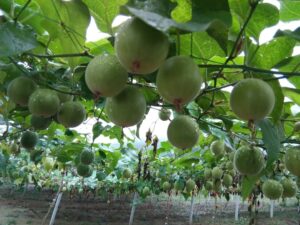The extract from monk fruit has become somewhat of a no-calorie celebrity in the burgeoning $8 billion global market for sugar substitutes.
The fruit is extremely sweet — and rare.
The inner pulp of this small tennis-ball shaped gourd measures between 100 to 250 times sweeter than table sugar, according to the U.S. Food and Drug Administration, but its global supply isn’t able to keep up with its increasing demand. Monk fruit is native only to select provinces within the subtropical mountains of southern China and northern Thailand. Efforts to grow it at scale in the United States have fallen short.
But a Research Triangle startup believes it has a way to commercialize monk fruit sweetener, and it’s growing inside its Durham greenhouses.
Elo Life Systems doesn’t actually use monk fruit to produce the sweetener. Instead, its scientists replicate monk fruit DNA and insert it into more common fruits and vegetables — like tomatoes and watermelons. These surrogate crops are then grown to make monk fruit sweetener themselves.
“We Trojan Horse the fruit,” said Matt DiLeo, vice president of product development at Elo. “We’re teaching the plant to do something new.”
Elo, formerly a division of the Durham-based Precision BioSciences, spun off on its own in December 2021. The company now has 31 employees and occupies offices, wet labs and a greenhouse on the Alexandria Center for Life Sciences campus in Research Triangle Park.
In February, Elo closed its Series A funding round after raising $24.5 million and anticipates expanding its staff by 50% over the next year.
The startup isn’t strictly focused on monk fruit. It has also partnered with Dole to cultivate a disease-resistant banana.
“RTP is the center of so much AgTech and FoodTech right now,” said Todd Rands, Elo’s president and CEO. “We’re really benefiting from the education here, with the population of scientists.”
Read more and watch video